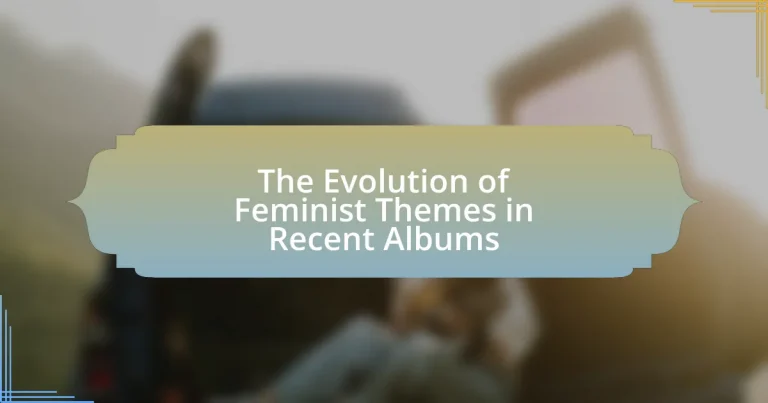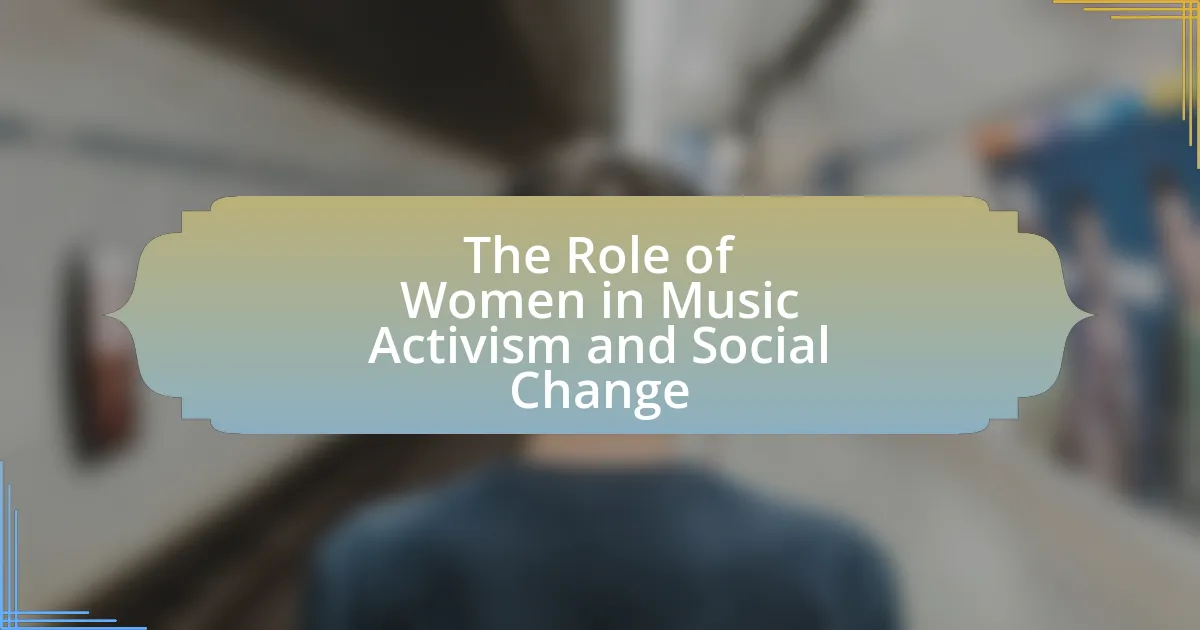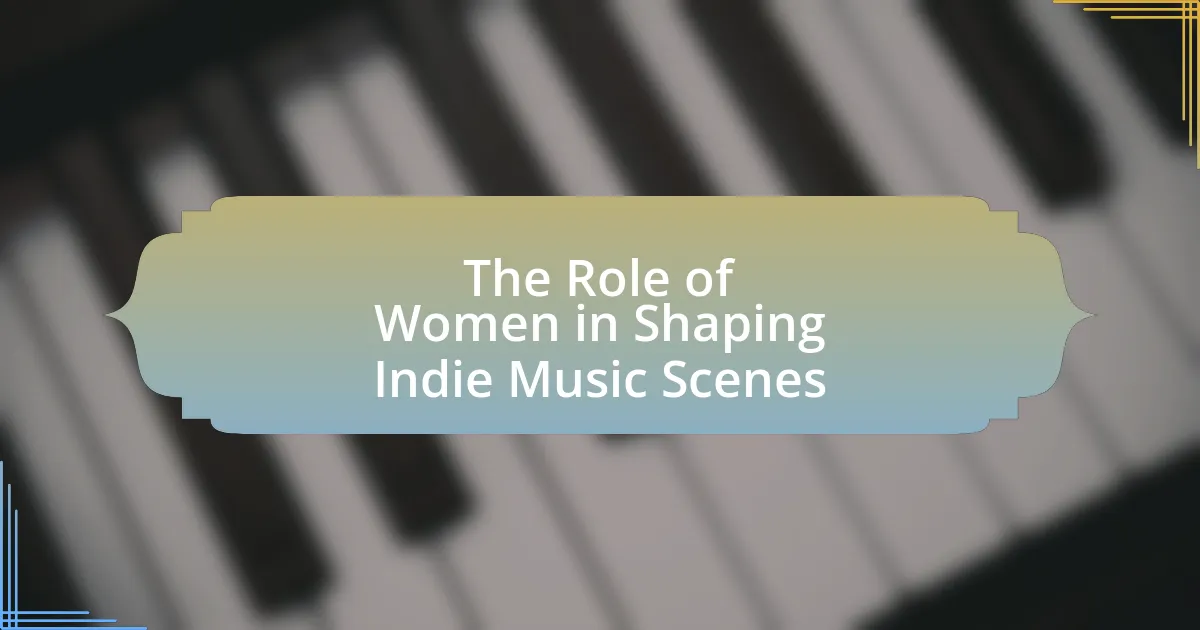The article examines the evolution of feminist themes in recent music albums, highlighting key concepts such as empowerment, body positivity, and intersectionality. It discusses how these themes have shifted over the past decade, influenced by historical events like the women’s suffrage movement and the #MeToo movement. Various music genres, including pop, hip-hop, and punk rock, reflect these feminist ideals, with notable artists like Beyoncé, Lizzo, and Janelle Monáe leading the charge. The article also emphasizes the importance of analyzing feminist themes in music for understanding gender dynamics and societal norms, while providing insights into how listeners can engage with and support feminist artists.
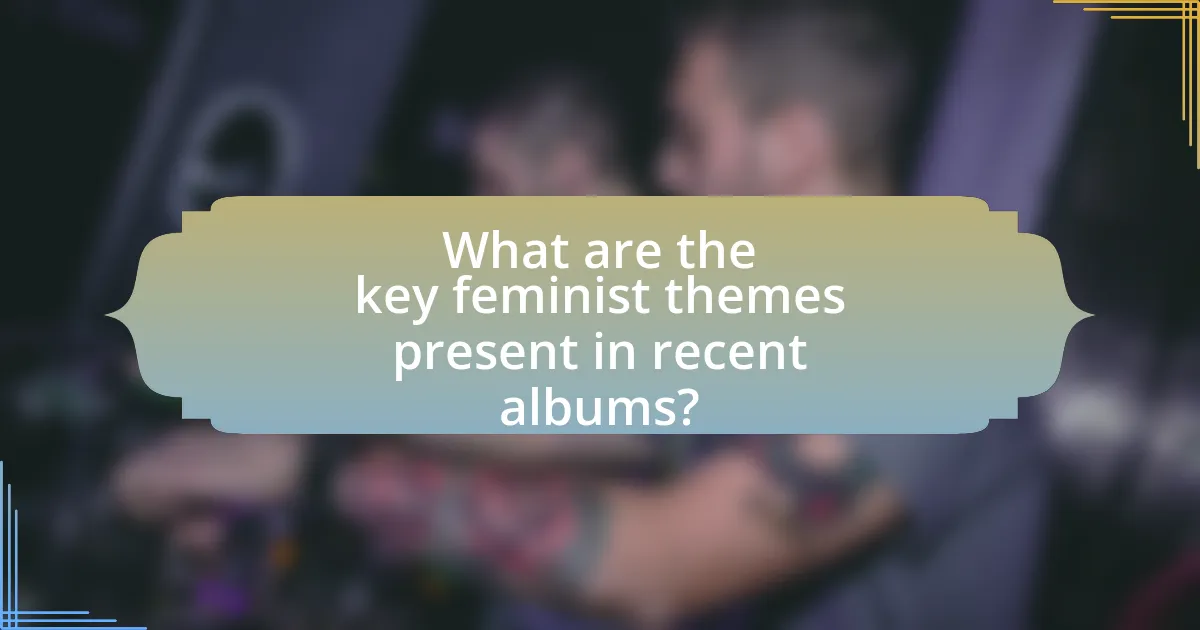
What are the key feminist themes present in recent albums?
Key feminist themes present in recent albums include empowerment, body positivity, and intersectionality. Empowerment is often expressed through lyrics that promote self-confidence and independence, as seen in tracks by artists like Lizzo and Beyoncé, who emphasize self-love and resilience. Body positivity is highlighted in songs that challenge societal beauty standards, with artists like Megan Thee Stallion celebrating diverse body types. Intersectionality is addressed by artists such as Janelle Monáe, who explore the complexities of race, gender, and sexuality, reflecting the multifaceted experiences of women today. These themes collectively illustrate a shift towards a more inclusive and diverse representation of feminism in contemporary music.
How have feminist themes evolved in music over the past decade?
Feminist themes in music have evolved significantly over the past decade, transitioning from a focus on individual empowerment to a broader critique of systemic issues such as intersectionality and social justice. Artists like Beyoncé and Lizzo have highlighted personal narratives of empowerment while also addressing societal inequalities, as seen in songs like “Formation” and “Juice.” Additionally, the #MeToo movement has influenced musicians to confront issues of sexual harassment and misogyny more openly, with tracks like Kesha’s “Praying” serving as anthems of resilience and healing. This evolution reflects a growing awareness of diverse feminist perspectives, emphasizing inclusivity and solidarity among marginalized groups.
What historical events have influenced the portrayal of feminism in music?
The portrayal of feminism in music has been significantly influenced by key historical events such as the women’s suffrage movement, the second-wave feminism of the 1960s and 1970s, and the #MeToo movement. The women’s suffrage movement, which culminated in the 19th Amendment in 1920, inspired early feminist artists to express themes of empowerment and equality in their music. Second-wave feminism brought issues like reproductive rights and workplace equality to the forefront, leading artists like Joan Baez and Aretha Franklin to incorporate these themes into their songs. The #MeToo movement, which gained momentum in 2017, has further shaped contemporary music by encouraging artists to address sexual harassment and gender inequality, as seen in the works of musicians like Taylor Swift and Billie Eilish. These historical events have collectively shaped the narrative and representation of feminism in music across different eras.
How do different genres of music reflect feminist themes?
Different genres of music reflect feminist themes through their lyrics, artist representation, and cultural impact. For instance, punk rock often embodies feminist ideals by challenging societal norms and advocating for women’s rights, as seen in the works of bands like Bikini Kill, which popularized the Riot Grrrl movement in the 1990s. Similarly, hip-hop has increasingly included feminist perspectives, with artists like Nicki Minaj and Cardi B addressing issues of female empowerment and sexuality, thereby reshaping narratives around women in a traditionally male-dominated genre. Additionally, pop music has embraced feminist themes through artists like Beyoncé, whose song “Run the World (Girls)” promotes female strength and independence, reflecting broader societal shifts towards gender equality. These examples illustrate how various music genres serve as platforms for feminist expression, influencing listeners and contributing to ongoing discussions about gender roles and equality.
Why is it important to analyze feminist themes in music?
Analyzing feminist themes in music is important because it reveals how gender dynamics and societal norms are expressed and challenged through artistic expression. Music serves as a cultural mirror, reflecting and shaping public perceptions of gender roles, empowerment, and identity. For instance, artists like Beyoncé and Taylor Swift have used their platforms to address issues such as sexism and body positivity, influencing listeners and sparking conversations about women’s rights. Research indicates that music can significantly impact social attitudes; a study published in the Journal of Social Issues found that exposure to feminist messages in popular music can lead to increased awareness and support for gender equality. Thus, examining these themes not only enhances our understanding of music’s role in social change but also highlights the ongoing struggle for women’s rights in contemporary society.
What impact do feminist themes have on listeners and society?
Feminist themes significantly impact listeners and society by promoting gender equality and challenging traditional gender roles. These themes encourage critical thinking about societal norms, leading to increased awareness and advocacy for women’s rights. For instance, studies show that music with feminist messages can inspire listeners to engage in activism, as seen in the rise of movements like #MeToo, which gained momentum through cultural expressions in music and media. Furthermore, feminist themes in albums often reflect and amplify the voices of marginalized groups, fostering a sense of community and empowerment among listeners. This cultural shift contributes to broader societal changes, as evidenced by increased discussions around gender issues in public discourse and policy reforms aimed at achieving gender parity.
How do feminist themes challenge traditional gender roles in music?
Feminist themes challenge traditional gender roles in music by promoting female empowerment, autonomy, and the deconstruction of stereotypes. Artists like Beyoncé and Lizzo use their platforms to assert women’s rights and redefine femininity, often addressing issues such as body positivity and sexual agency. For instance, Beyoncé’s “Flawless” incorporates the phrase “I woke up like this,” which emphasizes self-acceptance and confidence, directly opposing societal pressures on women’s appearance. Additionally, Lizzo’s “Truth Hurts” celebrates self-love and independence, encouraging women to prioritize their own happiness over societal expectations. These examples illustrate how feminist themes in music actively disrupt conventional gender norms and advocate for a more inclusive representation of women.
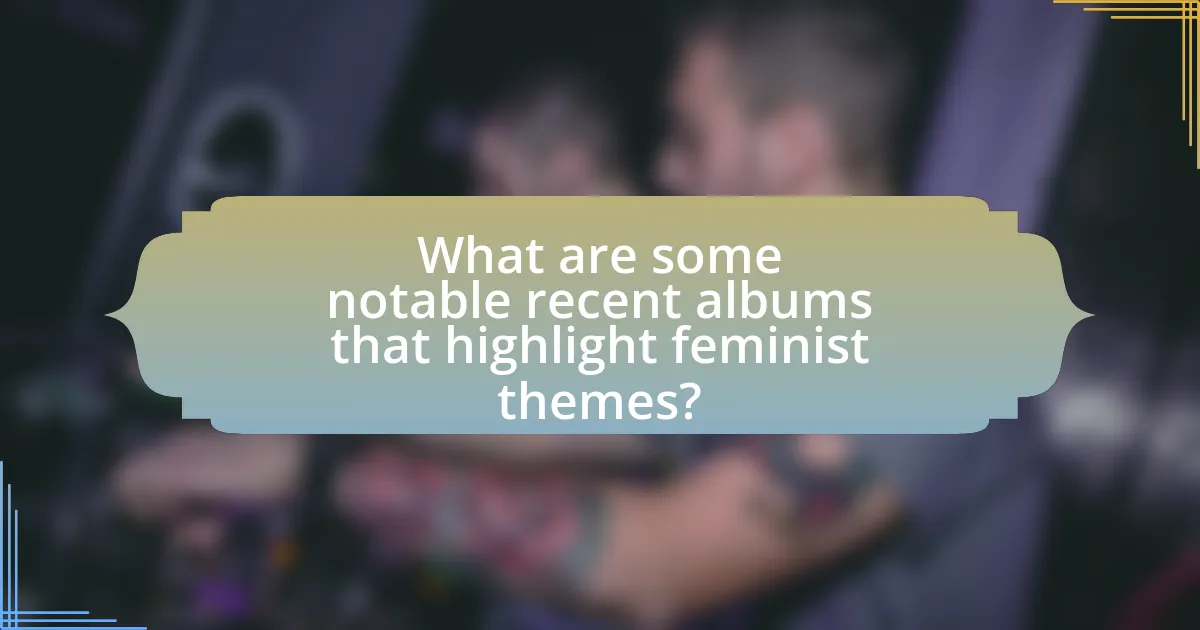
What are some notable recent albums that highlight feminist themes?
Notable recent albums that highlight feminist themes include “Renaissance” by Beyoncé, “SOUR” by Olivia Rodrigo, and “Planet Her” by Doja Cat. “Renaissance” explores themes of empowerment and self-acceptance, celebrating queer culture and femininity. “SOUR” addresses the complexities of young womanhood, including heartbreak and self-identity, resonating with a generation of listeners. “Planet Her” combines elements of sexuality and independence, showcasing women’s strength and autonomy. Each of these albums has received critical acclaim for their lyrical content and cultural impact, reinforcing the relevance of feminist themes in contemporary music.
Which artists are leading the way in feminist music today?
Artists leading the way in feminist music today include Billie Eilish, Lizzo, and Halsey. Billie Eilish addresses themes of body image and mental health in her music, notably in songs like “Not My Responsibility,” which critiques societal expectations of women. Lizzo promotes body positivity and self-love, exemplified in her hit “Truth Hurts,” which emphasizes empowerment and resilience. Halsey explores issues of identity and gender in tracks like “Without Me,” highlighting personal experiences and societal pressures. These artists are recognized for their impactful lyrics and advocacy for women’s rights, contributing significantly to the feminist music movement.
What specific songs from these albums exemplify feminist messages?
Songs that exemplify feminist messages from recent albums include “Run the World (Girls)” by Beyoncé, which celebrates female empowerment and independence, and “Bad Girls” by M.I.A., which challenges gender norms and advocates for women’s rights. Additionally, “Girl on Fire” by Alicia Keys promotes resilience and strength in women. These songs convey strong feminist themes through their lyrics and overall messages, reinforcing the importance of women’s voices and experiences in contemporary music.
How do these albums compare to earlier feminist works in music?
These albums exhibit a more intersectional approach compared to earlier feminist works in music. While earlier feminist music often focused primarily on women’s rights and gender equality, recent albums incorporate diverse themes such as race, sexuality, and mental health, reflecting a broader understanding of feminism. For instance, artists like Beyoncé and Lizzo address issues of body positivity and racial identity, which were less emphasized in earlier feminist music. This evolution aligns with the contemporary feminist movement’s focus on inclusivity, as seen in the rise of intersectional feminism, which acknowledges the interconnectedness of various social identities and oppressions.
What role do collaborations play in promoting feminist themes in albums?
Collaborations play a crucial role in promoting feminist themes in albums by amplifying diverse voices and perspectives within the feminist discourse. When artists from various backgrounds come together, they create a richer narrative that challenges traditional gender norms and highlights issues such as empowerment, equality, and social justice. For instance, the collaboration between Beyoncé and Shakira in “Beautiful Liar” not only showcases female solidarity but also emphasizes the strength of women working together against patriarchal structures. This synergy can lead to increased visibility for feminist messages, as seen in projects like the “Women in Music Pt. III” album by Haim, which features multiple collaborations that address themes of female empowerment and resilience. Such partnerships often result in a broader audience reach, allowing feminist themes to resonate with listeners who may not engage with solo artists, thus fostering a more inclusive dialogue around gender issues in music.
How do collaborations between artists enhance feminist messages?
Collaborations between artists enhance feminist messages by combining diverse perspectives and amplifying voices that may otherwise be marginalized. When artists from different backgrounds collaborate, they create a richer narrative that reflects a broader spectrum of feminist issues, such as intersectionality and empowerment. For instance, the collaboration between Beyoncé and Shakira in “Beautiful Liar” not only showcases their individual strengths but also promotes solidarity among women in the music industry, reinforcing the idea that unity can lead to greater impact. This collaborative approach allows for a more nuanced exploration of feminist themes, making them more relatable and accessible to a wider audience.
What are some examples of successful feminist collaborations in recent albums?
Recent albums featuring successful feminist collaborations include “Renaissance” by Beyoncé, which showcases contributions from artists like Grace Jones and Tems, emphasizing empowerment and self-expression. Another notable example is “Chemtrails Over the Country Club” by Lana Del Rey, featuring collaborations with female artists such as Nikki Lane, highlighting themes of female solidarity and identity. Additionally, “An Evening with Silk Sonic” by Silk Sonic includes contributions from female artists, reinforcing messages of love and respect for women. These collaborations reflect a growing trend in the music industry where female artists unite to amplify feminist themes and support one another.
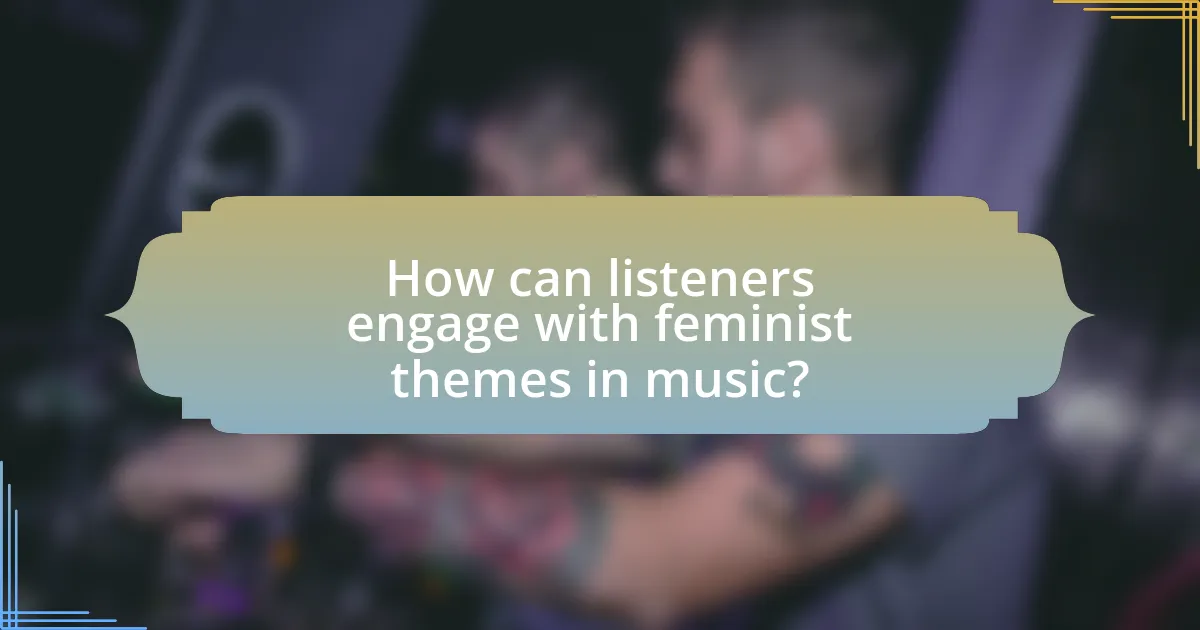
How can listeners engage with feminist themes in music?
Listeners can engage with feminist themes in music by actively analyzing lyrics, understanding the context of the songs, and supporting artists who promote gender equality. By examining the lyrics, listeners can identify messages related to women’s rights, empowerment, and social justice, which are often central to feminist themes. Contextual understanding involves recognizing the historical and cultural background of the music, such as the impact of the #MeToo movement on contemporary artists. Supporting artists who advocate for feminist issues, such as Beyoncé and Lizzo, reinforces the importance of these themes in the music industry. This engagement not only enhances the listening experience but also contributes to broader conversations about feminism in society.
What are some ways to support feminist artists and their work?
To support feminist artists and their work, individuals can actively purchase their art, attend their exhibitions, and promote their projects on social media. Purchasing art directly contributes to the financial stability of feminist artists, allowing them to continue creating. Attending exhibitions not only shows support but also increases visibility for their work, which can lead to further opportunities. Promoting their projects on social media helps to amplify their voices and reach a wider audience, fostering a community that values and uplifts feminist perspectives in the arts.
How can listeners create playlists that reflect feminist themes?
Listeners can create playlists that reflect feminist themes by selecting songs that address women’s rights, empowerment, and gender equality. This can include tracks by female artists who explicitly discuss feminist issues, such as Beyoncé’s “Flawless,” which incorporates quotes from feminist author Chimamanda Ngozi Adichie, or Lizzo’s “Good as Hell,” which promotes self-love and confidence. Additionally, listeners can include songs that challenge traditional gender roles, like Alanis Morissette’s “You Oughta Know,” which critiques toxic relationships. By focusing on lyrics that advocate for social change and featuring diverse voices from various backgrounds, listeners can curate a playlist that not only entertains but also educates and inspires.
What discussions can arise from analyzing feminist themes in music?
Analyzing feminist themes in music can lead to discussions about gender representation, empowerment, and societal norms. These discussions often explore how artists challenge traditional gender roles and address issues such as sexism, body positivity, and intersectionality. For instance, artists like Beyoncé and Lizzo use their platforms to promote messages of self-acceptance and resilience, sparking conversations about the impact of music on cultural perceptions of femininity. Additionally, examining lyrics and music videos can reveal underlying messages about women’s experiences and the evolution of feminist thought in contemporary society, as seen in the works of artists like Taylor Swift and Billie Eilish, who incorporate personal narratives that resonate with broader feminist movements.
What practical steps can listeners take to promote feminist themes in their communities?
Listeners can promote feminist themes in their communities by actively engaging in discussions about gender equality and supporting local feminist organizations. By participating in community events, such as workshops and panels focused on women’s rights, listeners can raise awareness and foster dialogue. Additionally, they can advocate for inclusive representation in local media and arts, ensuring that women’s voices and stories are highlighted. Supporting female artists and creators by attending their events and sharing their work on social media also amplifies feminist themes. Research shows that community engagement in feminist initiatives leads to increased awareness and support for gender equality, as evidenced by studies from organizations like the Women’s Media Center, which highlight the impact of grassroots activism on societal change.
How can community events incorporate feminist music themes?
Community events can incorporate feminist music themes by featuring female artists and bands that promote gender equality and women’s empowerment. These events can include performances, workshops, and discussions centered around feminist lyrics and messages, creating a platform for dialogue about women’s rights. For instance, events can showcase songs that address issues like domestic violence, reproductive rights, and body positivity, which are prevalent in contemporary feminist music. Additionally, community events can collaborate with local feminist organizations to raise awareness and funds, further embedding feminist themes into the cultural fabric of the event. This approach not only highlights the evolution of feminist themes in music but also fosters a supportive environment for advocacy and education.
What resources are available for further exploration of feminist music themes?
Resources for further exploration of feminist music themes include academic journals, books, and online platforms dedicated to music studies. Notable academic journals such as “Women & Music: A Journal of Gender and Culture” provide peer-reviewed articles on feminist musicology. Books like “Feminism and Music: A Critical Survey” by Susan McClary offer in-depth analyses of feminist themes in music. Additionally, platforms like JSTOR and Google Scholar host a variety of research papers and theses that explore the intersection of feminism and music. These resources collectively contribute to a comprehensive understanding of feminist themes in contemporary music.
